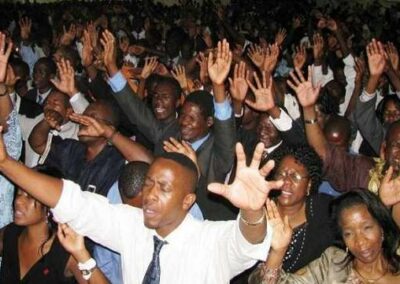The Ghanaian Police have banned religious groups from making new year predictions and prophecies, saying they could result in panic, unnecessary anxiety and even death. Chief Superintendent Grace Ansah-Akrofi disclosed this in a statement released on Tuesday.
“As the year 2022 draws to a close, we wish to once again entreat the general public, especially faith-based groups to ensure continuous compliance with the law as it relates to the communication of prophecies,” the statement reads.
Last year, the Ghanian Police, for the first time, instructed religious houses, especially churches, to refrain from making predictions for the new year. Some well-meaning Ghanaians challenged the order and described it as illegal. However, the religious community complied with the instruction, and the Police were satisfied with the compliance.
“We wish to commend the public, particularly religious groups, for their cooperation over the period by being circumspect and conscious of the law and adopting legally acceptable means of communicating prophecies to those affected,” the statement continued. “This has contributed greatly in creating an environment where people are able to freely profess their faith without unnecessary anxiety and fear of impending harm or death.”
Ghanian police have adopted December 27 as a day of reminding citizens of the need to refrain from prophesies and predictions for the new year. Last year’s warning and this year’s warning came exactly one year apart. However, the statement added that the order does not in any way violate the rights of citizens to exercise their rights to religious freedom. But some Ghanaians have challenged the order describing it as illegal and a violation of citizens’ freedom of worship.
An oppressive law?
Ghanian lawyer, Darko Sammy, said the law deviated from the fundamental right of citizens to worship freely. He argued that the court settled the issue when it acquitted a pastor that predicted the shooting of a popular Ghanaian musician.
“What happened to the only case that went to Court? Was the Pastor who prophesied in the Shatta Wale incident jailed or he was set free? The pastor won that case,” Darko Sammy wrote on Twitter.
Last year, the lawyer wrote an article published in myjoyonline. He said: “It is not even up for debate or interpretation by the highest court of Ghana. No law in Ghana grants the Police administration any POWERS to regulate prophecies in the country.”
“Religious freedom is more than the “freedom to worship” at a synagogue, church, or mosque. It means people shouldn’t have to go against their core values and beliefs in order to conform to culture or government unless it violates a specific law,” he added.
Mr Darko argued that new year prophesies will not cause unnecessary anxiety, just as a preacher telling people they’ll go to hell if they do not repent will not cause any tension.
He insisted that the Courts are not places for spiritual matters as evidence cannot be provided for such cases.
“It has been argued that the Courts have held that it does not dabble in spiritualities and cannot determine spiritual matters. What it wants is evidence,” Darko continued. “The Court can’t entertain spiritual matters much as spiritual people cannot produce spiritual evidence. If you can’t prove it how do you subject it to judicial review?”
He said the law should be repealed and the government should create new laws to regulate religion in line with modern and international standards.
What are new year’s prophecies?
On the last day of every year, most churches, especially pentecostal churches in Ghana and most of Africa, gather in their places of worship to thank God for the ending year and to pray for a better new year. The religious leaders use the opportunity to predict what will happen in the new year. In most cases, members are told that the new year will be better than the previous. At other times, economic woes, political conflicts, winners of elections, death of leaders and well-known citizens are also predicted.
While most religious leaders publicise some of the predictions that came to pass, none seems to be explaining the multiple failed predictions, which has raised doubts in the minds of many churchgoers.
The role of government in religion remains a contentious issue in Ghana and most countries of the world and the Police’s decision to bar new year prophesies will continue to be an unsettled argument as new year prophesies have become parts of the church system.








Great read.